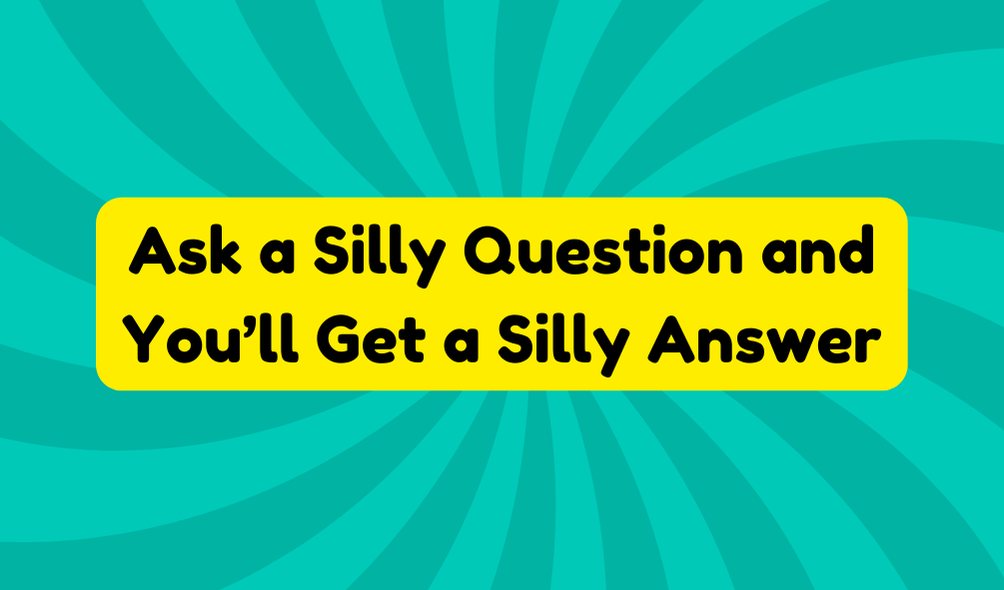The saying "ask a silly question and you'll get a silly answer" highlights the connection between inquiry and response quality. Silly questions often lead to absurd answers, which undermines effective communication. Thoughtful questioning is essential for meaningful dialogue. When inquiries lack depth or clarity, the responses tend to be equally trivial. This serves as a reminder of the importance of framing questions wisely to foster insightful discussions. To understand this further, exploring examples can be enlightening.
Synonyms
When exploring the phrase "ask a silly question and you'll get a silly answer," it becomes evident that there are several synonyms and related expressions that reflect similar sentiments about the nature of questioning and the responses it garners. These alternatives highlight the intrinsic link between question quality and answer wisdom, urging individuals to seek deeper inquiries to elicit insightful responses. Some notable phrases include:
- "There are no stupid questions"
- "Foolish queries yield foolish answers"
- "Curiosity killed the cat"
- "A question is a quest for knowledge"
- "Inquiries shape responses"
Such expressions serve as reminders to elevate the standard of questioning in pursuit of intelligent dialogue.
Example of Sentences
The phrase "ask a silly question and you'll get a silly answer" serves as a cautionary guideline in communication, emphasizing the importance of thoughtful inquiry. Silly inquiries can lead to absurd responses, undermining productive dialogue. To illustrate this, consider these examples:
- "If you could have any superpower, would you choose flying or peanut butter?"
- "Why don't fish play piano?"
- "Can you hug a tree to make it grow?"
- "Is cereal soup or not?"
- "If you could be any fictional character, would you be a potato?"
These questions highlight the necessity for thoughtful questioning to yield meaningful answers.
Origin
Rooted in historical discourse, the phrase "ask a silly question and you'll get a silly answer" resonates beyond its modern usage, reflecting deep-seated views on inquiry and intelligence. Emerging from a rich historical context, it mirrors sentiments found as early as the 1484 retelling of Aesop's fables by William Caxton. The cultural implications are evident, suggesting that poorly framed questions denote ignorance, inviting equally trivial responses. In a world increasingly valuing thoughtful discourse, this phrase serves as a cautionary reminder. Embracing nuance in inquiry can foster understanding, highlighting the interplay between intellect and the nature of questions posed.
Collocations
Collocations related to the phrase "ask a silly question and you'll get a silly answer" reveal interesting patterns in language usage that can affect communication. These expressions highlight the relationship between the type of inquiry and the corresponding response. They prompt reflection on how language shapes understanding and interaction.
- Silly inquiries provoke foolish responses.
- Thoughtful questioning encourages meaningful dialogue.
- Effective communication relies on inquiry quality.
- Frivolous questions may lead to misinterpretation.
- Reflective questioning fosters deeper insights.
In essence, embracing thoughtful questioning can lead to richer, more fruitful exchanges, transforming even the domain of seemingly silly inquiries into opportunities for growth.
How to Use in Everyday Language
Using phrases like "ask a silly question and you'll get a silly answer" in everyday conversations offers an opportunity to emphasize the importance of thoughtful inquiry. In discussions, one can reflect on how silly inquiries often lead to unhelpful responses, thereby highlighting the need for more meaningful conversations. By adopting a tone of skepticism toward superficial questions, individuals encourage thoughtful questioning instead. This approach fosters an environment where genuine curiosity thrives and valuable insights emerge. Ultimately, integrating this phrase serves not only as a reminder of the power of inquiry but also as a subtle call for deeper engagement in communication.
Why Is It Still Relevant Today?
While society often celebrates knowledge and intellectual curiosity, the phrase "ask a silly question and you'll get a silly answer" remains relevant today as a critical reminder of the relationship between inquiry and response. In an age that values innovation, promoting critical thinking is essential. Too often, careless questions yield disconnected or absurd answers, undermining effective communication. This phenomenon highlights the importance of formulating inquiries thoughtfully, fostering engagement and learning. As we navigate complex ideas, recognizing the consequences of our questions becomes crucial. Ultimately, this phrase calls for a more deliberate approach to inquiry, ensuring that responses reflect depth and relevance.







